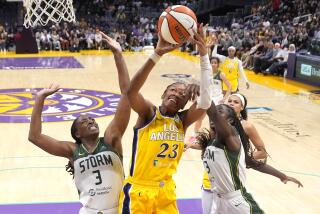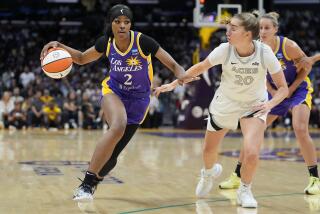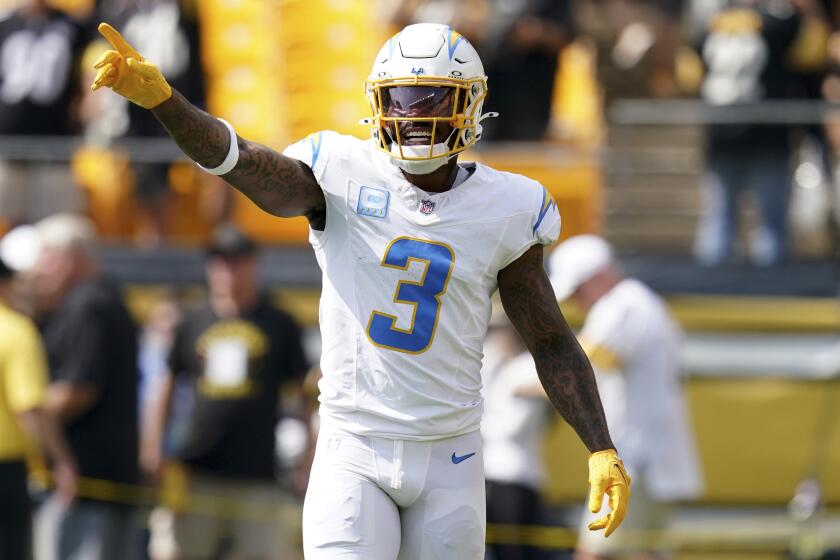Leon Sinks Teeth Into a Comeback : Bark May Be Worse Than Bite, but Tell Johnny, CHP He’s Back
DETROIT — Leon Spinks, gone from boxing for nearly two years and gone from the Carson monologue for only a bit longer, is making a comeback, probably on both fronts. Here he is now, ambling through the hothouse heat of the Kronk gym.
“Hey, Leon,” you say, recognizing that famous gap-toothed smile.
As he turns, his foot hooks a light standard that a TV crew had set up for interviews with other Kronk fighters. It topples and explodes.
This is the Spinks we have come to know and laugh at. A boxer-buffoon whose social inadequacies long inspired a community of comedy writers. His various misadventures with the modern automobile have made him one of the most famous drivers since Evel Knievel. And who since George Washington was known so well for false teeth?
Face it, do we remember Spinks for his Olympic gold medal or for his upset of Muhammad Ali, or do we remember him for the time he was mugged coming out of a Detroit bar, only to wake up naked in a motel room 13 hours later--minus his teeth, which later were found beneath the bed, a $45,000 blue fox fur coat, rings and chains? A champion, sure. But nobody was so bad at being good.
Even when his career veered toward the criminal, it somehow remained more ridiculous than desperate. A lot of fighters have been picked up for possession of drugs. But with a street value of $1.50? That inspired an entire cut on one of Richard Pryor’s albums.
We little remember Spinks the boxer, although he was as furious and as brave a fighter who ever stood in the ring. All we remember, nine years after he won an Olympic gold medal and seven after he stunned Ali for the heavyweight championship, is a career of public bumbling, a misdirected man whose entire life seemed to be symbolized by an arrest for driving the wrong way down a one-way street.
Now here he is, scattering things in the Kronk gym. On the back of his new training outfit is the appropriate message: “Look Out, Leon Is Back.”
Spinks hasn’t fought since March of 1983, when he lost his briefly held cruiserweight title to Carlos DeLeon. Since then, he said, he has been traveling with his brother, Michael, the light-heavyweight champion, thinking about his life. It is, by most accounts, a life that bears consideration.
You know parts of that life story, anyway. A St. Louis ghetto kid called Messover--because neighborhood kids used to routinely mess him over--becomes Olympic champion. A kid whose mother once had to protect him on the streets becomes heavyweight champion of the world. Tremendous opportunity is squandered in the night light, which is brightened considerably by a happy newcomer named Neon Leon.
Even before he gained the title, Spinks played hard. Sam Solomon, who trained Spinks for the first Ali fight, has told reporters that Spinks used to retire to his room, lock the door and crank up the music. Then he’d jump from the second-story window and make his way to a good time, somewhere. Solomon used to follow the footprints in the snow. Even with the local bartenders advised to withdraw service, it was not uncommon for other fighters, starting their own roadwork, to see Leon shuffling back through the snow in the early morning light.
The seven months he held the title, until Ali reclaimed it, was an especially heady time, devoted far more to the pursuit of happiness than to continued excellence in the ring. After he got his title, he was impossible to confine. Instead of leaving his room, he simply left cities. Believed to be training in Hilton Head, S.C., for example, Spinks would somehow turn up on the police blotter in St. Louis.
Spinks explains this strange time. “I was young and dumb. I didn’t know what it takes. I considered boxing a job. Once I did my job, it was time to go and play.” He pauses to remember: “Boy, did I play.”
It was all pretty new for Spinks. The kid who went through the Olympics with one shiny pair of pants suddenly had money, and friends to help him spend it. His father had once told him, “You’ll never be anything but a bum.” Oh, yeah? Look at this title, at this car, at this house, at these women, at these drugs.
Of course, he burned himself out. But he did it publicly so that each inevitable gaffe was recounted as part of a continuing saga in personal failure. Possession of drugs, firearms, failure to make utility payments--maybe he wouldn’t be anything but a bum after all. The jokes began but did not make everybody laugh. Spinks said that, on more than one night, he cried himself to sleep.
Still, he couldn’t help himself. For an important fight with Bernardo Mercado, which was to set up a title fight with Larry Holmes, Spinks trained like the Spinks of old. In the days before the fight, it was not unusual to see him in the casino disco in the early morning hours, his shirt stained with sweat. And it was entirely in keeping with his comic persona that he showed up late for the weigh-in because he couldn’t find a parking space.
Why wouldn’t he have been such a failure at success? What preparation had he had?
“Growing up, I never knew what a good time was,” he said. “You know, you can’t have a good time without money and I never had that. Once I got the money, I was just being human.”
The good time reduced him to a shell, shot through and through.
“I had no control of myself out of the ring,” Spinks told the Detroit News. “After a hard day of work, all I cared about was going on to the next party. Who was I going to get high with that night? Whose mother’s daughters was I going to meet up with that evening? Outside the ring, my life was cocaine, weed, cars and women. . . . And I enjoyed it.”
It turned out that he could no longer handle the heavyweights. A third-round knockout by Holmes in 1981 proved that. Then it turned out that he couldn’t handle the lesser cruiserweights either. He had that title for less than half a year.
The money was going and so were the friends. Close to bankruptcy last year, Spinks approached a pair of Detroit car dealers for support and soon enrolled at the Kronk gym, the one that already has champions Thomas Hearns and Milton McCrory.
He is 31; it is his last chance and, accordingly, he is promising a new regime.
“The partying, you don’t get that out of your system,” he says. “But now I’m going to wait till I’m done to do my partying.”
What is it he hopes to get done?
“Win the cruiserweight title, light-heavy, heavyweight, whatever,” he says. “Then me and my brother are going into TV or the movies. We’ll play ‘Simon and Simon.’ ” He laughs.
His comeback fight is four days away, although Spinks has been warning people that an abscessed tooth makes the fight only a possibility. Still, he is sparring in the Kronk gym, with no apparent regard for his infected tooth.
He is in the ring with a fighter named Vernon Bridges. Although Kronk people claim to have rehabilitated Bridges, there is no denying his 4-12 record. He is called Burning Bridges by the other boxers in the gym.
The taller Bridges is turning Spinks this way and that. Spinks is working furiously. Like the Spinks we remember, he does not back away, ever. But his punches are curiously ineffective. They seem open-handed. He lunges awkwardly and it is not nice to see.
After four rounds, the sparring is stopped. There is blood on Spinks’ shirt. Both his eyes are puffy. An amateur trainer, disgusted and ashamed at the same time, turns away. “He’s shot.”
In the dressing room, Spinks hunkers on a bench, out of breath. He looks at his shoes. “It’s dog-eat-dog out there,” he says.
Another boxer, toweling off nearby, answers, “Dog-eat-dog.”
Spinks says, “Nobody cuts you slack.”
The other boxer answers, “No slack whatsoever.”
Later that night it is announced that Spinks’ comeback fight has been postponed another three weeks. It is announced that his tooth is bothering him.
More to Read
Go beyond the scoreboard
Get the latest on L.A.'s teams in the daily Sports Report newsletter.
You may occasionally receive promotional content from the Los Angeles Times.










